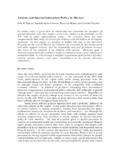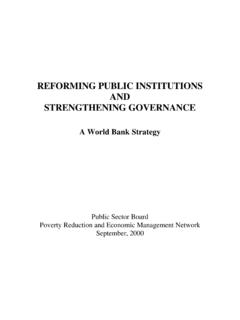Transcription of Civil Society Organizations and the Functions of Global ...
1 Civil Society Organizations and the Functions of Global Health governance : what Role within intergovernmental Organizations ? Kelley Lee Amid discussion of how Global health governance should and could be strengthened, the potential role of Civil Society Organizations has been frequently raised. This paper considers the role of Civil Society Organizations (CSOs) in four health governance instruments under the auspices of the World Health organization the International Code on the Marketing of Breastmilk Substitutes, Framework Convention on Tobacco Control, International Health Regulations and Codex Alimentarius - and maps the Functions they have contributed to. The paper draws conclusions about the opportunities and limitations CSOs represent for strengthening Global health governance (GHG).
2 INTRODUCTION A wide range of studies of Global health governance (GHG) have drawn attention to significant shortfalls in existing institutional arrangements to deal with the challenges posed by a rapidly changing world. Problems such as gaps or overlaps in mandates and activities,1 undemocratic representation, insufficient transparency and accountability,2 irrational distribution of resources,3and ultimately a lack of effectiveness in meeting Global health needs, are longstanding The emerging assemblage of institutions, rules and resources concerned with Global health has evolved on a largely ad hoc basis, defined as much by political and economic power, as by health needs and priorities. Overall, there is a sense that GHG is characterised by a considerable degree of within this context, discussion over the past decade of how GHG should, and could, be strengthened has included consideration of the potential role of Civil Society Organizations (CSOs).
3 While CSOs have been defined in a myriad of ways, within the context of this paper, CSOs are defined as distinct from Organizations and institutions of the state and the market. According to the World Health organization (WHO), CSOs inhabit the social arena between the state and citizen, and is not part of the state or market (for profit sector). 6 Similarly, the World Bank defines CSOs as the wide array of non-governmental and not-for-profit Organizations that have a presence in public life, expressing the interests and values of their members or others, based on ethical, cultural, political, scientific, religious or philanthropic considerations. Civil Society Organizations (CSOs) therefore refer to a wide of array of Organizations : community groups, non-governmental Organizations (NGOs), labor unions, indigenous LEE, Civil Society Organizations AND THE Functions OF Global HEALTH governance Global HEALTH governance , VOLUME III, NO.
4 2 (SPRING 2010) 2 groups, charitable Organizations , faith-based Organizations , professional associations, and within health development, CSOs have historically focused on health service delivery, notably in low and middle-income countries. Since the 1980s, health-related CSOs have proliferated in type, number and Functions they perform, a development largely seen in positive Where governments have not delivered basic health services, for example, CSOs have stepped in as contracted by the state or donors, or have sought to fill gaps through charitable work. Where specific population groups have been neglected by the state and/or market, CSOs have campaigned to influence policy priority setting on their behalves. Where there has been a lack of public or private funding for health needs, CSOs have raised public awareness and mobilized resources.
5 Where corporate conduct has adversely affected population health, CSOs have advocated for appropriate regulation. In short, there has been an increase in CSO activity in recent decades, including a diversification in the Functions they perform. As CSOs have come to play a more prominent role, there has been more critical reflection on the governance of CSOs themselves, as well as their performance of specific health governance Functions . As state and market-based actors have come under greater scrutiny, so too has there been a desire to assess CSOs against principles of good governance . 9 what Functions do CSOs play and are they appropriate? How well are these Functions fulfilled? Are CSOs sufficiently accountable and transparent, and to whom? To what extent is there sufficient evaluation of CSO activities?
6 As described in the Human Development Report 2002: [W]hen such groups spring from agendas or use tactics that are contrary to democratic values, they can be both Civil and uncivil . The rise of such groups poses challenges for truly democratic political Civil Society groups recognize that they must be publicly accountable for their There is a particular need for systematic analysis of the Functions CSOs perform in Global health governance . While built on health governance at the subnational, national and regional levels, GHG is distinguished from international health governance by health needs and interests that increasingly cut across and, in some cases, are oblivious to state boundaries. To effectively address these Global health challenges, there is a need to strengthen, supplement and even replace existing forms of IHG.
7 [S]tate and nonstate actors have long interacted on health governance . The difference for GHG will lie in their degree of involvement and nature of their respective roles , varying with the health issue The emergent relationship between state and non-state actors (including CSOs) is particularly significant in GHG. LEE, Civil Society Organizations AND THE Functions OF Global HEALTH governance Global HEALTH governance , VOLUME III, NO. 2 (SPRING 2010) 3 This paper examines the interaction of CSOs with intergovernmental health Organizations (IGOs), defined as Organizations ostensibly concerned with health in which states comprise their core membership. It briefly reviews four health governance instruments the International Code on the Marketing of Breastmilk Substitutes, Framework Convention on Tobacco Control, International Health Regulations and Codex Alimentarius under the auspices of the WHO, the United Nations (UN) specialised agency for health with 193 member states.
8 The fourth is also a joint instrument under the Food and Agriculture organization (FAO), another UN specialised agency with 191 member states. Following a brief overview of the engagement of CSOs by WHO, this paper draws on a framework by Haas (2003) to map their contribution to specific governance Functions in relation to these four instruments. The paper discusses how effective CSO involvement has been, and draws conclusions about the opportunities and limitations CSOs represent for strengthening GHG. INCREASING ENGAGEMENT WITH CSOS IN HEALTH governance Given the growing complexity of these health and security challenges and the response required, these issues concern not only governments, but also international Organizations , Civil Society and the business community.
9 Recognizing this, the World Health organization is making the world more secure by working in close collaboration with all concerned. Margaret Chan, Director General, WHO, World Health Day, 2007 Since the early 1990s, there has been widespread support within IGOs for enhancing the role of CSOs in health development including governance . The Development Assistance Committee of the OECD, for example, argues that Civil Society can play a crucial role in preventing violent conflict and in building peace. 12 UNAIDS describes CSOs as being at the forefront of prevention, care and support programmes, particularly among the most vulnerable and hard-to-reach populations. 13 The World Bank s consultations with Civil Society are seen to have improved the quality of policymaking, positively influenced the direction of country programmes, strengthened national ownership of key reforms, and promoted public sector transparency and accountability.
10 14 In WHO, a Civil Society Initiative (CSI) was launched in 2001 to undertake a review of both official and informal relations between WHO and Civil Society Organizations (CSOs); to develop a renewed policy for more effective collaboration, information exchange and dialogue with CSOs and improve the support offered by WHO to Member States in their work with NGOs and CSOs. 15 Critics long pointed to the organization s traditional emphasis on ministries of health, while formal relations with non-state ( Civil Society and market-based) institutions remained limited. The increased prominence of public-private partnerships in WHO from the late 1990s raised concerns about undue influence by corporate Following a meeting with representatives of the People s Health Assembly (PHA), Director-General Gro Harlem Brundtland initiated efforts to improve engagement with CSOs.








